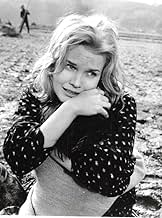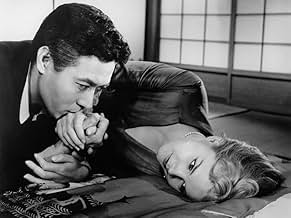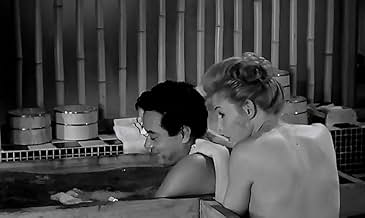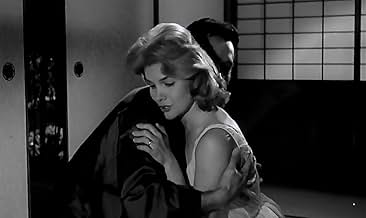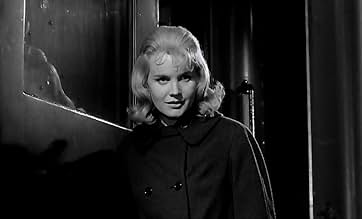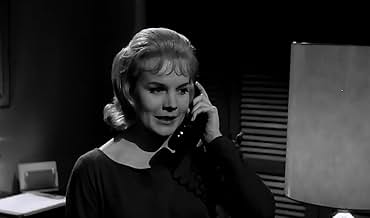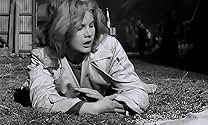Agrega una trama en tu idiomaBased on a true story, this compelling drama relates the difficulties of a young woman married to a Japanese diplomat during World War II, victim of suspicion and animosity from her husband'... Leer todoBased on a true story, this compelling drama relates the difficulties of a young woman married to a Japanese diplomat during World War II, victim of suspicion and animosity from her husband's government.Based on a true story, this compelling drama relates the difficulties of a young woman married to a Japanese diplomat during World War II, victim of suspicion and animosity from her husband's government.
- Dirección
- Guionistas
- Elenco
- Premios
- 2 nominaciones en total
- Dirección
- Guionistas
- Todo el elenco y el equipo
- Producción, taquilla y más en IMDbPro
Opiniones destacadas
James Shigeta puts in an outstanding performance as Bakers Japanese husband who while in America acts very westernized. Once back in his homeland he acts much different and Shigetas job at this adds much to the film. The struggles of an interracial marriage are part of the story along with the horrors and hardships of being in a land that is becoming ravaged by total war being waged against it. In viewing this film you'll find yourself asking "How would I feel if I were in a foreign land with a wife or husband who was a native of that country and the nation of my birth was waging war on it". Who is the enemy? My spouses people or mine?
This movie had a profound effect on my wife, who saw it right after its release in 1961 with her sister. They were 11 and 8 at the time. The woman in the movie is from from East Tennessee and we are from West Tennessee. I do not understand why it was never copied and sold. It is a great movie. The historical context is meaningful for anyone interested in Pearl Harbor, World War 2, MacArthur, or the Japanese interment during WW2. It is a classic love story, on the order of Romeo and Juliet, but with world wide implications. This will be the first time my wife has seen it in 45 years !!!
This was a true story about an American girl who came to Washington, DC, and there she met a Japanese diplomat. They fell in love and got married very quickly. Then WWII broke out, and all Japanese were deported back to their country. Gwen Teresaki went with her husband to Japan. It shows all the differences between the two cultures, and how Hidenari Terasaki became a teacher to his wife, Gwen, about the customs of the Japanese. It's truly a beautiful love story as well as a realistic account of the difficulties of this interracial marriage.
I really believe more should see this movie as it can open up your eyes as to the fact that all of us should live together in peace and get along. I will never forget this movie/life story! I wish the movie would come out again or be re-made as I believe it would help us all !
¿Sabías que…?
- TriviaThe memoir narrates the life of Gwen Harold (1906-1990), an American from Tennessee who in 1931 married Hidenari "Terry" Terasaki (b.1900), a Japanese diplomat. He was first secretary at the Japanese embassy in Washington, D.C., in 1941 when Pearl Harbor was bombed, was one of the staff who helped translate the Japanese declaration of war and delivered it (late) to the U.S. government and (as Gwendolen Terasaki wrote in her memoirs) earlier sent secret messages to Japanese pacifists seeking to avert war. The couple and their daughter Mariko were, like all Axis diplomats, interned in 1942 and repatriated via neutral Angola later that year. Terasaki held various posts in the Japanese foreign affairs department up to 1945 when he became an advisor to the emperor, and was the official liaison between the imperial palace and General Douglas MacArthur, the Supreme Allied Commander.
Mariko and her mother left Japan in 1949 so that Mariko could attend East Tennessee State University in Johnson City, Tennessee. Terry died in 1951 in Japan at the age of 50.
During the scene in which the Japanese ambassador tries to persuade Gwen to call off the marriage, he seems to hint at a possible conflict between the two countries. However, it is unlikely that he would have been aware of any definitive war aims in 1935, as Japan was still at peace with China. Soon after, Japan would declare war and, in protest against its actions, the United States would issue an oil embargo against Japan, escalating the disagreement between the two and paving the way for war.
The speech that Hirohito gives on the radio at the end of the film is a part of the actual recording of the speech that was played to announce plans of surrender. However, Terry's translation for Gwen is actually only bits and pieces of the much longer speech, but it sounds as though he is translating it word for word.
- ErroresAlthough the story is set in the 1930's and 1940's, the characters' clothing and hairstyles are those of the late 1950's/early 1960's.
- Citas
Gwen Terasaki: Well, go on say it: I was a shameless hussy and I disgraced your household. Well I am not going to crawl on my knees to you just because I made a little social error.
Hidenari Terasaki: Social error? Forgetting your place as wife of my household? Insulting a guest?
Gwen Terasaki: Who insulted whom, I'd like to know. What are you getting so worked up for anyhow? You didn't agree with him either.
Hidenari Terasaki: That is my privilege as a man, not yours. You were rude and humiliating. Acting thus may be permissible in the State of Tennessee...
Gwen Terasaki: Never mind the State of Tennessee, at least they treat women like human beings. Why the minute you stepped off the ship you started pushing me around like a 14th Century samurai.
Hidenari Terasaki: 16th Century.
Gwen Terasaki: Okay. Well this is the twentieth. I don't mind going in the doors behind you. I don't even mind bowing to your friends and relatives but when a girl can't even open her mouth without starting a scandal...
Hidenari Terasaki: Then keep mouth shut! According to custom.
Gwen Terasaki: Your customs. Not mine. And you can put them back in the Middle Ages where they belong. Furthermore I am sick of smiling and scraping and bowing even when you'd like to murder somebody. I'm sick of all the set of complicated rules that put honour and duty before simple human truth. I'm sick of a place where people can't show their real emotions; where women are treated like pieces of furniture and it's a quaint old custom for fathers to sell their baby daughters.
Hidenari Terasaki: Stop weeping!
Gwen Terasaki: I'll weep if a I want to.
Hidenari Terasaki: Trick of American women to obtain pity. Stop it!
Gwen Terasaki: I know what they call me at the Foreign Office; "Terasaki's Falling". Well Aunt Peggy was right and so was your ambassador. I only wish I'd listened to them
- Créditos curiosos[prologue] This film is based on actual events in the life of Gwen Terasaki, as told in her autobiography.
- ConexionesEdited from Treinta segundos sobre Tokio (1944)
Selecciones populares
- How long is Bridge to the Sun?Con tecnología de Alexa
Detalles
- Tiempo de ejecución1 hora 53 minutos
- Color
- Relación de aspecto
- 1.66 : 1
Contribuir a esta página




